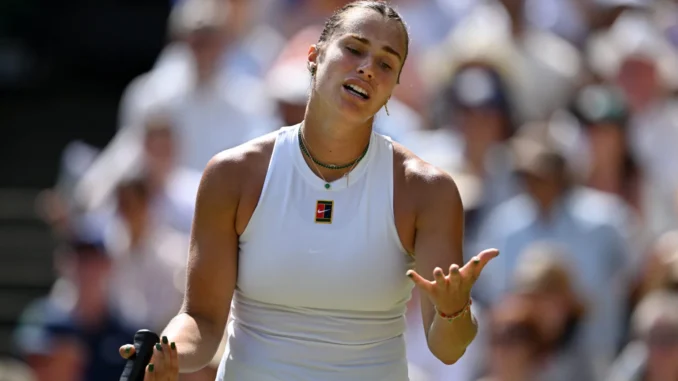
Aryna Sabalenka, the world No. 1 women’s tennis player, has never been one to shy away from speaking her mind, and her latest comments have ignited a conversation about the grueling demands of the WTA Tour. As she prepares for her opening match against Marketa Vondrousova at the 2025 Cincinnati Open, the Belarusian star voiced frustration with the relentless pace of the professional tennis schedule, describing it as “crazy” and “impossible” to maintain peak performance week after week. Her candid remarks, delivered ahead of a crucial hard-court swing, underscore the physical and mental toll of a season that has tested even the most resilient players.
Sabalenka’s 2025 campaign has been a rollercoaster of triumphs and challenges. The 27-year-old began the year with a commanding title run at the Brisbane International, defeating Polina Kudermetova in the final. She followed with runner-up finishes at the Australian Open and Indian Wells, falling to Madison Keys and Coco Gauff, respectively, before capturing the Miami Open title without dropping a set. Her consistency was evident at Wimbledon, where she reached the semifinals—her joint-best result at the All England Club—only to lose a hard-fought three-setter to Amanda Anisimova. “This season has been really intense, and it’s impossible to be on your best level every day of every week,” Sabalenka said, reflecting on the exhaustion that prompted her to skip the WTA events in Washington and Montreal after Wimbledon. “I felt like I was getting really exhausted, even at Paris. I came to Wimbledon because it was a really short break, and it was getting worse and worse.”
The WTA’s packed calendar, with mandatory tournaments like WTA 500 and 1000 events, has long been a point of contention for players. Sabalenka’s decision to take a break post-Wimbledon was strategic, aimed at preserving her energy for the Cincinnati Open and the upcoming US Open, where she is the defending champion. “We are humans, like it’s impossible to handle this intensity,” she stated, highlighting the pressure of competing in high-stakes events with minimal recovery time. “Every week there is a mandatory tournament, the schedule is crazy, honestly.” Her team planned the break in advance, though she noted, “If I had lost first round at Wimbledon, probably I wouldn’t skip these tournaments because I would have those days off.” This calculated approach reflects her growing maturity in managing her career, a stark contrast to earlier years when emotional outbursts, like her controversial Roland Garros press conference, drew criticism.
Sabalenka’s comments echo a broader sentiment among players, as seen in her 2023 critique of the WTA Finals in Cancun, where she felt “really disrespected” by poor organization and inadequate practice facilities. “We just started trying to manage the energy better,” she explained, emphasizing the need to prioritize mental and physical health. Her 2025 season, with 51 match wins and three titles, showcases her dominance—she leads the WTA Race by 3,000 points, a gap larger than the total points of world No. 12 Daria Kasatkina. Yet, the toll of back-to-back finals, including losses at the Australian Open, Roland Garros, and Stuttgart, has fueled her call for change. “Sometimes we cannot control others,” she said, reflecting on external pressures. “I just have to move forward and do what I love.”
Her outspokenness resonates with peers like Iga Swiatek, who also skipped events to prepare for the WTA Finals, and draws parallels to past players like Novak Djokovic, who have criticized tour schedules. Sabalenka’s aggressive playing style, marked by a powerful serve and forehand speeds that rival ATP players, demands immense physical effort, making recovery critical. Her ability to reach at least the quarterfinals in her last ten Grand Slams, including three titles, underscores her resilience, but also the strain of constant competition. “I’m super excited to go out there and fight,” she said of her Cincinnati campaign, where she’s a two-time champion and faces a tough draw with potential matchups against Swiatek or Gauff.
As Sabalenka navigates the hard-court season, her critique of the WTA’s “crazy” schedule highlights a pivotal moment for the sport. Will her voice, amplified by her No. 1 status, spark reforms to ease player burnout? For now, she’s focused on channeling her energy into defending her US Open crown, proving that even under pressure, she remains a force to be reckoned with. Her journey—marked by raw power, emotional candor, and a relentless drive—continues to captivate, as she balances the demands of stardom with a call for a more sustainable future in tennis.
Leave a Reply